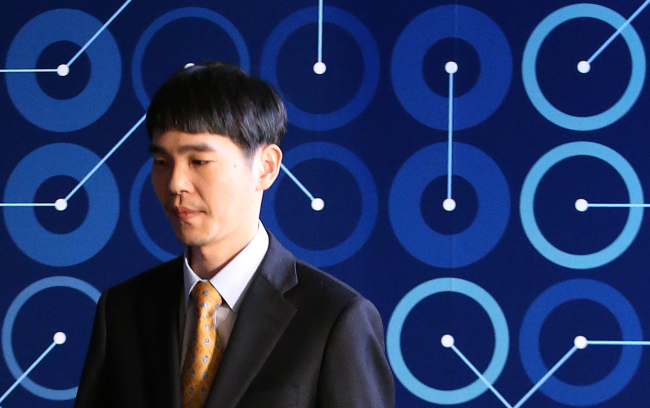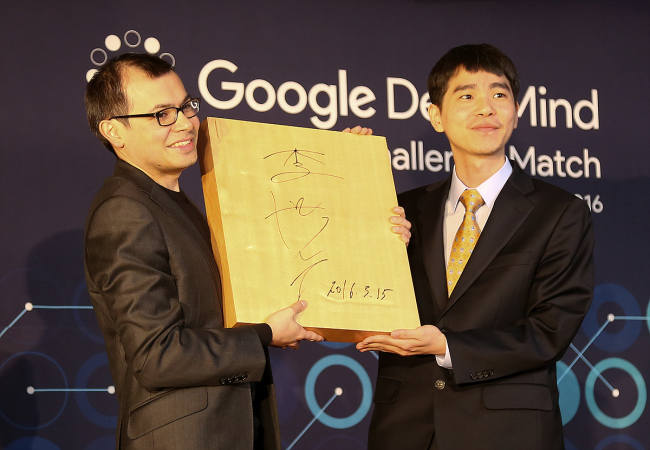Go-playing artificial intelligence program AlphaGo won a historic match against Korean Go grandmaster Lee Se-dol with a final score of 4-1.
Although Lee put up a good fight, he resigned after 280 moves in the final showdown, which lasted around five hours -- the longest in the five-game match.
“It is regrettable that I could not wrap up the match by winning the final round.” said Lee, attending a press conference after the final game at Four Seasons Hotel in Gwanghwamun on Tuesday.
“I thought I got an upper hand in the earlier stage of the game today, but I eventually lost because I was not good enough,” Lee said.
The Go-playing software boasted its almost impeccable capability to read and predict, and was able to maintain a slight lead throughout the final round.
For the first time over the course of the five games, both players entered the overtime period, where a player is given only three one-minute time slots per move.
“Lee was able to deploy strategies that few professional players can pull off,” official commentator Michael Redmond said.
It took 25 seconds for Lee, playing black Tuesday, to place his first stone at the two-four point in the right top area (the intersection between the second line from right and the fourth line from top).
AlphaGo spent one minute and 25 seconds to “think,” and made its first move on the four-four point in the left top corner (the intersection between the fourth line from left and the fourth line from top).
Determined to cruise to a second straight win, Lee made aggressive moves in the beginning phase of the game, reinforcing territory by placing four stones and three stones on the right top and bottom areas. AlphaGo responded by putting three white stones at each area.
The human player also tried to invade deep into the left top territory to earn gains where AlphaGo tried to build its own sphere of influence from the beginning.
Lee seemed to exude confidence while spending less time to make a move than he did in the previous game.
Lee and his AI opponent continued nip-and-tuck fights again across the Go board with a 19-by-19 grid of lines.
AlphaGo made mistakes here and there in the earlier phase. Referring to the blunders, commentator Redmond mused, “It seems that AlphaGo did not recover from game four.“
The Go battle with computer program AlphaGo did not turn out to be as easy as Korean Go grandmaster Lee Se-dol had previously expected. Having underestimated the software‘s capability, the top Go player with 18-international titles under his belt suffered three straight losses.
The match could have led to a lopsided victory of the computer program powered by more than 1,200 central processing units and another 200 graphics processing units.
Despite the slim chance to turn the tide, the human Go professional showed a great deal of resilience against the AI opponent as he picked up a long-coveted win in game four on Sunday, which Lee described as the most valuable thing that he would not exchange for anything.
Many professional Go players and commentators for the match pointed out that the 78th move by Lee was what tilted the scale in favor of the 33-year-old pro.
The move, along with the following sequence of moves, was so spectacular that many Go professionals have referred to it as “God’s touch.”
In an interview before the final round Tuesday, David Silver, team lead of DeepMind, a Google subsidiary and developer of the AI, said the “probability of human (professional) players playing the move was 1 in 10,000.”
Although AlphaGo started off confident in positions, things went sour for AlphaGo due to the 78th move, and the AI software had to begin replanning its plays, according to the DeepMind engineer.
He said a team of engineers from the AI company later gathered together to figure out problems behind a series of rather bizarre moves by AlphaGo after Lee’s 78th move.
Chiming in with the DeepMind engineer, commentator Michael Redmond said move 78 was “exceptional.”
Praising the creative play of Lee, DeepMind chief executive David Hassabis told The Korea Herald that “AlphaGo seems to have inspired Lee Se-dol to sort of grow to the next level.”
Before the match kicked off last week, Lee had expected he would beat the AI by either 5-0 or 4-1, but the end result turned out the other way around.
Regardless of the result, the match between the human player and the AI will likely impact not only the Go community, but all of Korean society.
“There was so much attention paid to the Go community that I have not seen in my life,“ said Lee Ha-jin, Go player and secretary general of the International Go Federation, which has 75 registered country members and organizes world Go championships.
The Korean government has recently announced plans to invest around 20 billion won ($16.8 million) to set up an AI control tower aimed to nurture AI businesses in the domestic market.
The sales of Go boards and stones have soared in recent weeks with an online commerce website seeing sales increase 42 percent over the past month.
Korean tech giants Samsung Electronics and LG Electronics are reportedly speeding up their efforts to develop their own AI and deploy the technology to their existing and future projects.
By Kim Young-won (wone0102@heraldcorp.com)
Although Lee put up a good fight, he resigned after 280 moves in the final showdown, which lasted around five hours -- the longest in the five-game match.
“It is regrettable that I could not wrap up the match by winning the final round.” said Lee, attending a press conference after the final game at Four Seasons Hotel in Gwanghwamun on Tuesday.
“I thought I got an upper hand in the earlier stage of the game today, but I eventually lost because I was not good enough,” Lee said.
The Go-playing software boasted its almost impeccable capability to read and predict, and was able to maintain a slight lead throughout the final round.
 |
| Korean Go master Lee Se-dol attends the press conference after the final round of the match with artificial intelligence AlphaGo in Seoul on Tuesday. (Yonhap) |
For the first time over the course of the five games, both players entered the overtime period, where a player is given only three one-minute time slots per move.
“Lee was able to deploy strategies that few professional players can pull off,” official commentator Michael Redmond said.
It took 25 seconds for Lee, playing black Tuesday, to place his first stone at the two-four point in the right top area (the intersection between the second line from right and the fourth line from top).
AlphaGo spent one minute and 25 seconds to “think,” and made its first move on the four-four point in the left top corner (the intersection between the fourth line from left and the fourth line from top).
Determined to cruise to a second straight win, Lee made aggressive moves in the beginning phase of the game, reinforcing territory by placing four stones and three stones on the right top and bottom areas. AlphaGo responded by putting three white stones at each area.
The human player also tried to invade deep into the left top territory to earn gains where AlphaGo tried to build its own sphere of influence from the beginning.
Lee seemed to exude confidence while spending less time to make a move than he did in the previous game.
Lee and his AI opponent continued nip-and-tuck fights again across the Go board with a 19-by-19 grid of lines.
 |
| Korean Go player Lee Se-dol(right) and DeepMind CEO Demis Hassabis pose with a Go board autographed with Lee`s name.(Google) |
AlphaGo made mistakes here and there in the earlier phase. Referring to the blunders, commentator Redmond mused, “It seems that AlphaGo did not recover from game four.“
The Go battle with computer program AlphaGo did not turn out to be as easy as Korean Go grandmaster Lee Se-dol had previously expected. Having underestimated the software‘s capability, the top Go player with 18-international titles under his belt suffered three straight losses.
The match could have led to a lopsided victory of the computer program powered by more than 1,200 central processing units and another 200 graphics processing units.
Despite the slim chance to turn the tide, the human Go professional showed a great deal of resilience against the AI opponent as he picked up a long-coveted win in game four on Sunday, which Lee described as the most valuable thing that he would not exchange for anything.
Many professional Go players and commentators for the match pointed out that the 78th move by Lee was what tilted the scale in favor of the 33-year-old pro.
The move, along with the following sequence of moves, was so spectacular that many Go professionals have referred to it as “God’s touch.”
In an interview before the final round Tuesday, David Silver, team lead of DeepMind, a Google subsidiary and developer of the AI, said the “probability of human (professional) players playing the move was 1 in 10,000.”
Although AlphaGo started off confident in positions, things went sour for AlphaGo due to the 78th move, and the AI software had to begin replanning its plays, according to the DeepMind engineer.
He said a team of engineers from the AI company later gathered together to figure out problems behind a series of rather bizarre moves by AlphaGo after Lee’s 78th move.
Chiming in with the DeepMind engineer, commentator Michael Redmond said move 78 was “exceptional.”
Praising the creative play of Lee, DeepMind chief executive David Hassabis told The Korea Herald that “AlphaGo seems to have inspired Lee Se-dol to sort of grow to the next level.”
Before the match kicked off last week, Lee had expected he would beat the AI by either 5-0 or 4-1, but the end result turned out the other way around.
Regardless of the result, the match between the human player and the AI will likely impact not only the Go community, but all of Korean society.
“There was so much attention paid to the Go community that I have not seen in my life,“ said Lee Ha-jin, Go player and secretary general of the International Go Federation, which has 75 registered country members and organizes world Go championships.
The Korean government has recently announced plans to invest around 20 billion won ($16.8 million) to set up an AI control tower aimed to nurture AI businesses in the domestic market.
The sales of Go boards and stones have soared in recent weeks with an online commerce website seeing sales increase 42 percent over the past month.
Korean tech giants Samsung Electronics and LG Electronics are reportedly speeding up their efforts to develop their own AI and deploy the technology to their existing and future projects.
By Kim Young-won (wone0102@heraldcorp.com)





No comments:
Post a Comment